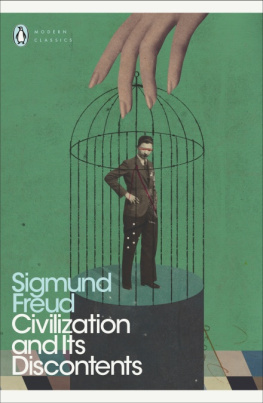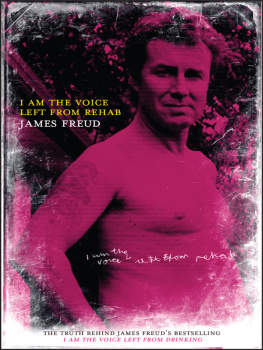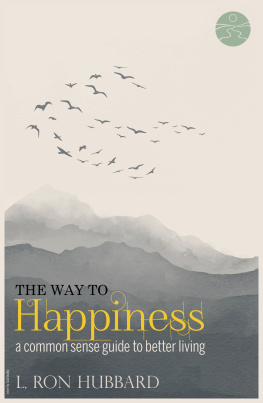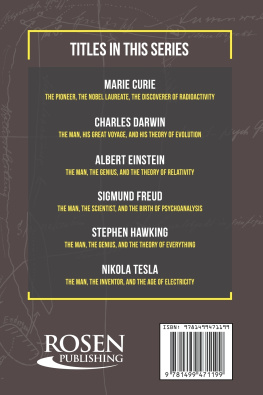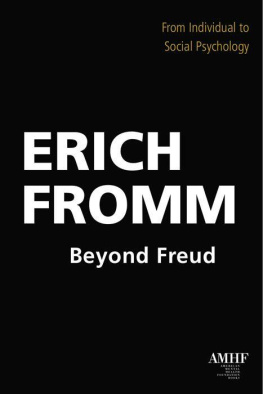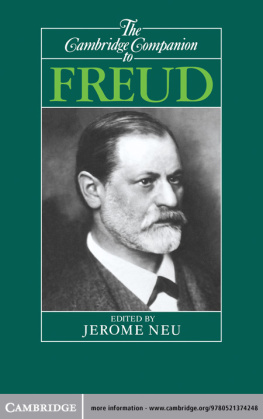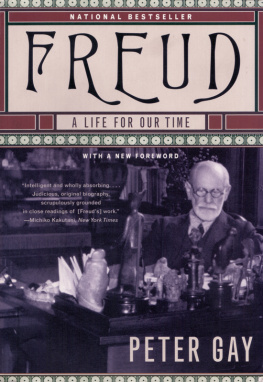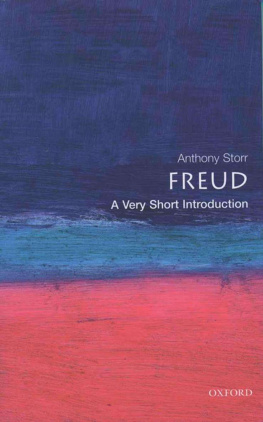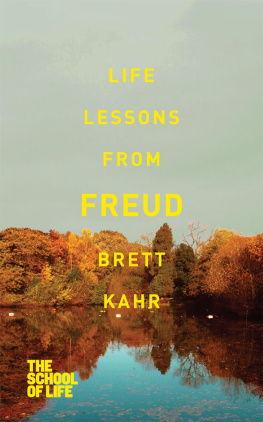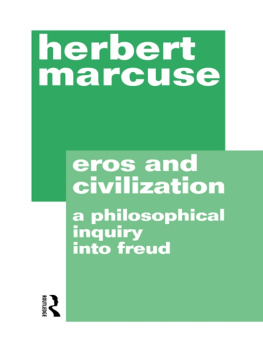Sigmund Freud
18561939
Sigmund Freud
Civilization and Its Discontents
TRANSLATED BY DAVID M c LINTOCK
PENGUIN BOOKS GREAT IDEAS
PENGUIN BOOKS
Published by the Penguin Group
Penguin Books Ltd, 80 Strand, London WC2R 0RL , England
Penguin Group (USA) Inc., 375 Hudson Street, New York, New York 10014, USA
Penguin Books Australia Ltd, 250 Camberwell Road, Camberwell, Victoria 3124, Australia
Penguin Books Canada Ltd, 10 Alcorn Avenue, Toronto, Ontario, Canada M4V 3B2
Penguin Books India (P) Ltd, 11 Community Centre, Panchsheel Park, New Delhi 110 017, India
Penguin Group (NZ), Cnr Airborne and Rosedale Roads, Albany, Auckland 1310, New Zealand
Penguin Books (South Africa) (Pty) Ltd, 24 Sturdee Avenue, Rosebank, 2196, South Africa
Penguin Books Ltd, Registered Offices: 80 Strand, London WC2R 0RL , England
www.penguin.com
Des Unbehagen in der Kultur first published 1930
This translation first published in Penguin Books 2002
This edition first published 2004
Sigmund Freuds German texts collected as Gesammelte Werke (194052)
copyright 1941, 1948 by Imago Publishing Co. Ltd
Translation copyright David McLintock, 2002
All rights reserved
Taken from the New Penguin Freud edition of Civilization and Its Discontents, translated by David McLintock and introduced by Leo Bersani. The General Editor for the series is Adam Phillips
The moral right of the translator has been asserted
Except in the United States of America, this book is sold subject to the condition that it shall not, by way of trade or otherwise, be lent, re-sold, hired out, or otherwise circulated without the publishers prior consent in any form of binding or cover other than that in which it is published and without a similar condition including this condition being imposed on the subsequent purchaser
ISBN: 978-0-14-196423-2
1
It is impossible to resist the impression that people commonly apply false standards, seeking power, success and wealth for themselves and admiring them in others, while underrating what is truly valuable in life. Yet in passing such a general judgement one is in danger of forgetting the rich variety of the human world and its mental life. There are some individuals who are venerated by their contemporaries, but whose greatness rests on qualities and achievements that are quite foreign to the aims and ideals of the many. One may be inclined to suppose that these great men are appreciated after all only by a minority, while the great majority have no interest in them. However, it is probably not as simple as that, owing to the discrepancies between peoples thoughts and actions and the diversity of their desires.
One of these outstanding men corresponds with me and in his letters calls himself my friend. I sent him a little piece of mine that treats religion as an illusion, and in his reply he said that he wholly agreed with my view of religion, but regretted that I had failed to appreciate the real source of religiosity. This was a particular feeling of which he himself was never free, which he had found confirmed by many others and which he assumed was shared by millions, a feeling that he was inclined to call a sense of eternity, a feeling of something limitless, unbounded as it were oceanic. This feeling was a purely subjective fact, not an article of faith; no assurance of personal immortality attached to it, but it was the source of the religious energy that was seized upon by the various churches and religious systems, directed into particular channels and certainly consumed by them. On the basis of this oceanic feeling alone one was entitled to call oneself religious, even if one rejected every belief and every illusion.
This opinion of my esteemed friend,myself of the primary nature of such a feeling. But this does not entitle me to dispute its actual occurrence in others. The only question is whether it is correctly interpreted and whether it should be acknowledged as the fons et origo of all religious needs.
I have nothing to suggest that would decisively contribute to the solution of this problem. The idea that a person should be informed of his connection with the world around him through an immediate feeling that is used for this purpose from the beginning sounds so bizarre, and fits so badly into the fabric of our psychology, that we are justified in looking for a psychoanalytic that is to say a genetic derivation of such a feeling. The following train of thought then suggests itself. Normally we are sure of nothing so much as a sense of self, of our own ego. This ego appears to us autonomous, uniform and clearly set off against everything else. It was psychoanalytic research that first taught us that this was a delusion, that in fact the ego extends inwards, with no clear boundary, into an unconscious psychical entity that we call the id, and for which it serves, so to speak, as a faade. And psychoanalysis still has much to tell us about the relation of the ego to the id. Yet externally at least the ego seems to be clearly and sharply delineated. There is only one condition admittedly an unusual one, though it cannot be dismissed as pathological in which this is no longer so. At the height of erotic passion the borderline between ego and object is in danger of becoming blurred. Against all the evidence of the senses, the person in love asserts that I and you are one and is ready to behave as if this were so. What can be temporarily interrupted by a physiological function must of course be capable of being disturbed by morbid processes also. Pathology acquaints us with a great many conditions in which the boundary between the ego and the external world becomes uncertain or the borderlines are actually wrongly drawn. There are cases in which parts of a persons own body, indeed parts of his mental life perceptions, thoughts, feelings seem alien, divorced from the ego, and others in which he attributes to the external world what has clearly arisen in the ego and ought to be recognized by it. Hence, even the sense of self is subject to disturbances, and the limits of the self are not constant.
A further consideration tells us that the adults sense of self cannot have been the same from the beginning. It must have undergone a process of development, which understandably cannot be demonstrated, though it can be reconstructed with a fair degree of probability. The new-born child does not at first separate his ego from an outside world that is the source of the feelings flowing towards him. He gradually learns to do this, prompted by various stimuli. It must make the strongest impression on him that some sources of stimulation, which he will later recognize as his own physical organs, can convey sensations to him at any time, while other things including what he most craves, his mothers breast are temporarily removed from him and can be summoned back only by a cry for help. In this way the ego is for the first time confronted with an object, something that exists out there and can be forced to manifest itself only through a particular action. A further incentive to detach the ego from the mass of sensations, and so to recognize a world outside, is provided by the frequent, multifarious and unavoidable feelings of pain (or absence of pleasure), whose termination and avoidance is required by the absolute pleasure principle. A tendency arises to detach from the ego anything that may give rise to such unpleasurable experience, to expel it and so create an ego that is oriented solely towards pleasure and confronts an alien and menacing world outside. The limits of this primitive pleasure-oriented ego are inevitably corrected by experience. After all, some of the things that give us pleasure and that we are loath to forgo belong not to the ego, but to the object, and some of the torments that we wish to expel prove to be of internal origin and inseparable from the ego. We learn how to distinguish between the internal, which belongs to the ego, and the external, which comes from the world outside, through deliberate control of our sensory activity and appropriate muscular action. This is the first step towards establishing the reality principle, which will govern subsequent developments. The distinction between the internal and the external naturally serves a practical purpose, in that it provides protection against unpleasurable experiences and the threat of them. The fact that the ego employs exactly the same methods to expel certain unpleasurable sensations from within as it does to repel others from without becomes the starting point for significant pathological disorders.
Next page
